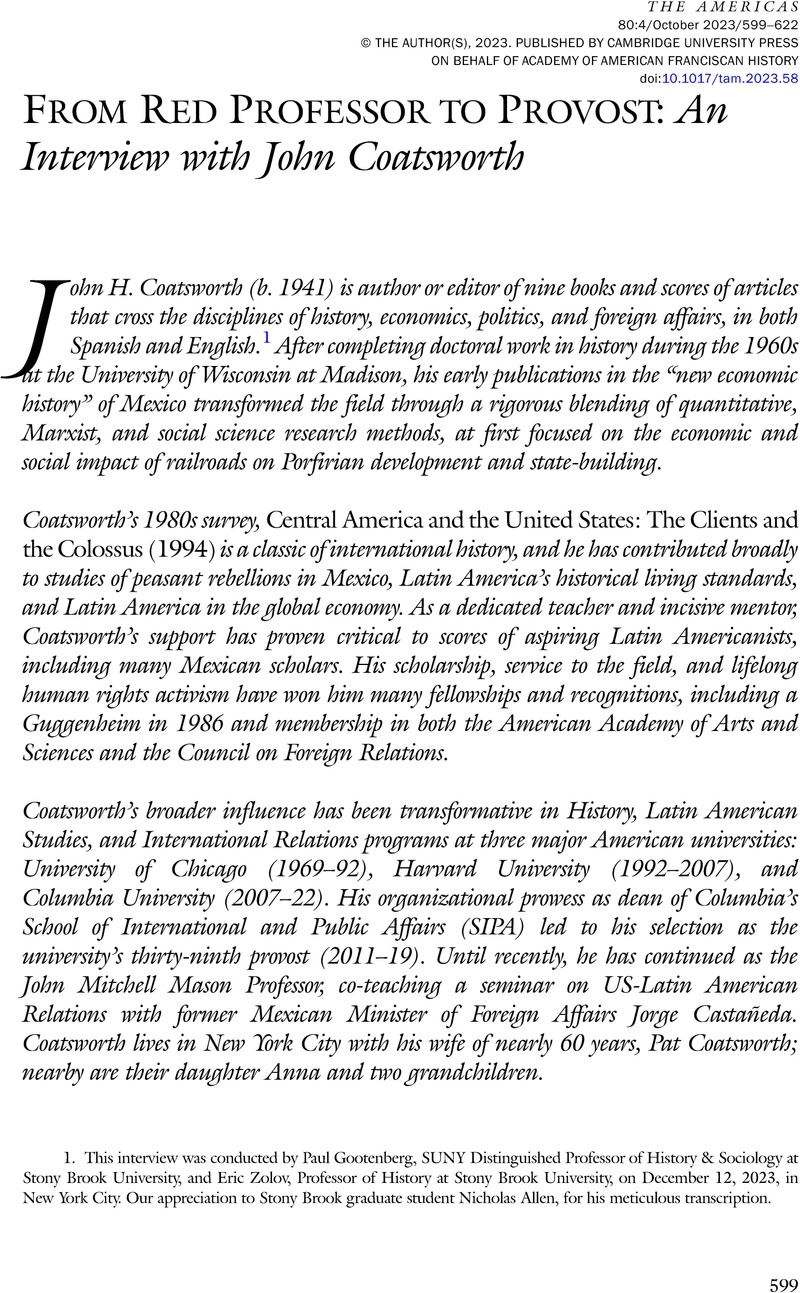No CrossRef data available.
Published online by Cambridge University Press: 10 October 2023

1. This interview was conducted by Paul Gootenberg, SUNY Distinguished Professor of History & Sociology at Stony Brook University, and Eric Zolov, Professor of History at Stony Brook University, on December 12, 2023, in New York City. Our appreciation to Stony Brook graduate student Nicholas Allen, for his meticulous transcription.
2. The Special Period (c. 1991–2000) followed the fall of the Soviet Union and introduced radical transformations in the Cuban economy and society.
3. William Appleman Williams (1921–90) was a revisionist US historian and prominent critic of the Cold War, widely known for his book The Tragedy of American Diplomacy (1959).
4. Beginning in late July of 1968, massive student-led demonstrations in protest of the government's authoritarian practices challenged the regime's political legitimacy and threatened to mar the XIX Olimpiad scheduled to open in Mexico City on October 12. On October 2, government forces massacred scores of students and innocent bystanders in the Plaza of the Three Cultures, also known as Tlatelolco.
5. William Taylor is a historian of colonial Mexico whose first book, Landlord and Peasant in Colonial Mexico (1972), was based on his 1969 doctoral dissertation under the mentorship of Charles Gibson. Josefina Zoraida Vázquez is a prominent Mexican historian of the nineteenth century and of US-Mexico relations.
6. Friedrich Katz (1927–2010) was a renowned historian of Mexico whose family found exile in Mexico in 1941 after fleeing Nazi-occupied Austria.
7. The National Autonomous University of Mexico (UNAM) was occupied by military forces in September in an attempt to squash the student movement.
8. Paul Baran (1909-64) was a Russian-born Marxist economist and Professor at Stanford University. His first book was The Political Economy of Growth (1957). A posthumously published book, Monopoly Capital: An Essay on the American Economic and Social Order (1966), was co-authored with political activist and Marxist economist, Paul Sweezy, founder of the Marxist journal Monthly Review.
9. Donald Scott is a historian of eighteenth- and nineteenth-century US history. Joan Wallach Scott is a US historian of France, known especially for her contributions to gender history and post-structural theory.
10. Herbert Klein is a prominent historian of Latin America who received his undergraduate and graduate degrees from the University of Chicago.
11. Jesse Lemisch (1936–2018) was a prominent New Left social historian who helped pioneer “bottom-up” history.
12. After completing his doctoral studies at the University of Vienna, Katz joined the faculty of Humboldt University in East Berlin in 1956. He left East Germany in 1968 following the Soviet invasion of Czechoslovakia and joined the University of Texas at Austin as a Visiting Professor before joining the University of Chicago in 1971.
13. Arthur Mann (1922-93) was a US political historian at Chicago.
14. Thomas Bentley Duncan (1929–2015) was a historian of colonial Latin America and Portugal who in 1968 became the first director of Chicago's Center for Latin American Studies.
15. Joseph Love is a prominent historian of Brazil.
16. Coatsworth, John, “Obstacles to Economic Growth in Nineteenth-Century Mexico,” American Historical Review 88:1 (February 1978): 80–99CrossRefGoogle Scholar.
17. CASPIC was a multi-year MacArthur Foundation grant that supported interdisciplinary teaching and research at a moment in the late 1980s when scholars were beginning to critique the boundaries of area studies.
18. John Mearsheimer is a prominent political scientist and “realist” international relations theorist at the University of Chicago.
19. Katz, Friedrich, ed., Riot, Rebellion, and Revolution: Rural Social Conflict in Mexico (Princeton: University of Princeton Press, 1988)CrossRefGoogle Scholar.
20. Robert Fogel (1926–2013) was a prominent US economic historian who helped pioneer the New Economic History. He received the 1993 Nobel Memorial Prize in Economic Sciences.
21. Coatsworth, John, Growth Against Development: The Economic Impact of Railroads in Porfirian Mexico (DeKalb, IL: Northern Illinois University Press, 1981)Google Scholar.
22. Arnold Carl Harberger is a US economist who began teaching at the University of Chicago in 1953.
23. In 1980, Harberger was forced to withdraw his appointment as the head of Harvard's Institute for International Development following revelations that he had been a paid consultant for the Pinochet regime.
24. Robert McNamara (1916–2009) was US Secretary of Defense from 1961-68.
25. Coatsworth was dean of SIPA from 2007-2011 and provost of Columbia University from 2011-2019.
Please note a has been issued for this article.